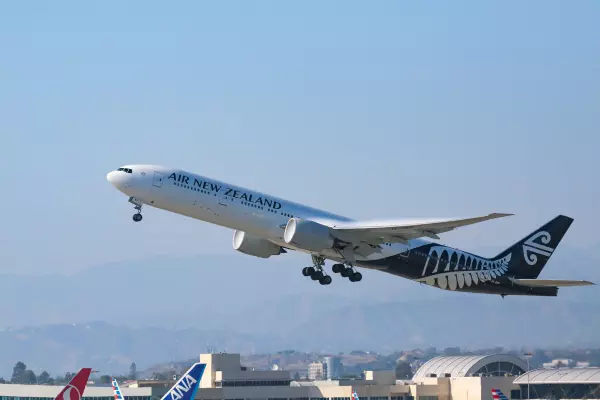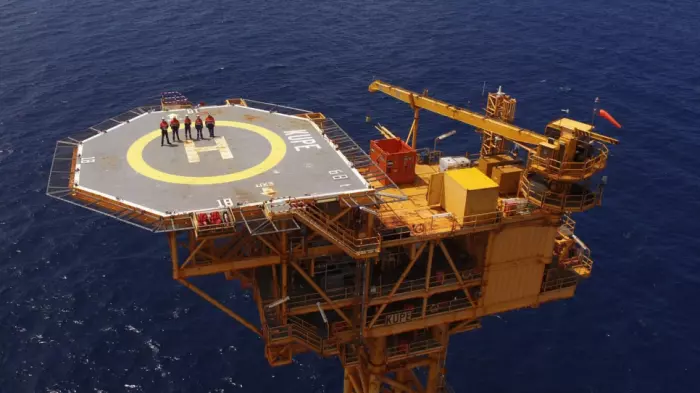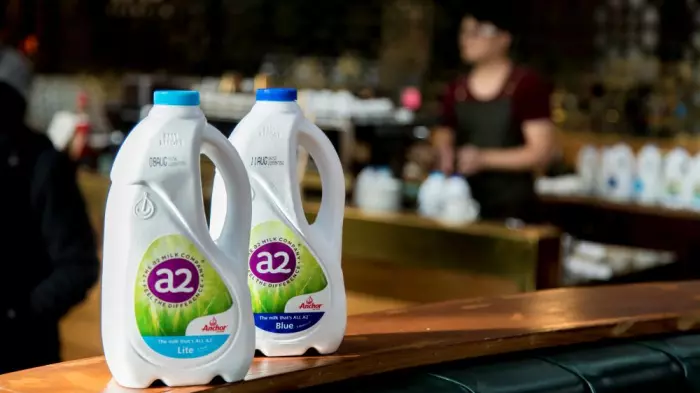Restaurant Brands Announces Annual Profit Result
FLLYR
Mon, Feb 28 2022 08:54 am
RESTAURANT BRANDS ANNOUNCES ANNUAL PROFIT RESULT
$NZm Dec 2021 Dec 2020 Change ($) Change (%)
Total Sales 1,068.2 892.4 +175.8 +19.7
Net Profit After Tax 51.9 30.6 +21.3 +69.3
Key Points
• Our billion dollar sales target has been achieved with total sales for the year of $1,068.2 million, up against the previous year, with full year positive same store sales growth across all four of our operating divisions.
• Reported net profit after tax of $51.9 million for the year was up $21.3 million on the last year, despite the ongoing adverse impact of COVID-19.
• Combined store EBITDA (pre NZ IFRS 16) for the period was $172.7 million, up 17.2% on the previous year.
• Total store numbers increased by 11 to 359 including the acquisition of five stores in Australia and two stores in California.
• The Taco Bell brand, launched in New Zealand and Australia (New South Wales) in late 2019, has continued to grow with 18 stores now successfully operating in these markets.
• Directors have declared a dividend of 32.0 cents per share, payable on 22 April to all shareholders on the register as at 8 April. The dividend will be paid fully imputed to NZ tax resident holders.
Overview
The FY21 result was once again adversely affected by COVID-19 with continued disruptions across all of the company’s operations, including an extended lockdown in New Zealand. However, all divisions have generally continued to trade through the crisis and consequently have achieved improved EBITDA results.
Offsetting the adverse impacts of COVID-19, the company saw its federal PPP loan in Hawaii forgiven resulting in an additional $11.4 million income. Also, as a result of an extended lockdown in New Zealand, the Company received $7.2 million in wage subsidies which was fully passed onto staff.
The resulting reported FY21 NPAT of $51.9 million is up 69.3% or $21.3 million on the prior year.
Group Operating Results
Directors are pleased to report that Restaurant Brands has produced a net profit after tax (NPAT) for the year ended 31 December 2021 (FY21) of $51.9 million, up 69.3% on the reported NPAT of $30.6 million for the prior period.
Direct comparisons between the two years remains difficult as both years have been adversely affected by COVID-19. This year’s result also includes the $11.4 million PPP loan forgiveness.
Total brand sales for the Company were $1,068.2 million, up $175.8 million on the previous year. This is primarily because of the inclusion of $156.5 million of sales in California, up $104.6 million on the four months of initial ownership in 2020. All four divisions produced positive same store sales.
Combined store EBITDA (pre-NZ IFRS 16 and Other Items) of $172.7 million was up $25.4 million or +17.2% on the prior year driven by the full year performance of the California division, which was $15.3 million up on the FY20 year. EBITDA margins (as a % of sales) reduced from 16.5% to 16.2% due to continued cost pressures, particularly in New Zealand and Australia.
Restaurant Brands’ store numbers at the end of the financial year totalled 359, comprising 137 in New Zealand, 73 in Hawaii, 79 stores in Australia and 70 stores in California.
New Zealand Operations
Total store sales in New Zealand were $461.1 million, up $50.7 million or +12.4% on the prior year ending December 2020. The 2021 result was adversely affected by a Level 4 lockdown across the country (including an extended lockdown in the major Auckland region which resulted in lost sales of approximately $26 million). Whilst last year’s result was impacted by eight weeks without trading due to COVID-19 with lost sales of approximately $40 million.
Actual 31 December 2021 Actual 31 December 2020 Change ($) Change (%)
Store sales ($m) 461.1 410.4 +50.7 +12.4%
EBITDA ($m) 83.3 75.9 +7.4 +9.7%
EBITDA as a % of Sales 18.1 18.5
Store Numbers 137 137
The New Zealand business was completely closed for two weeks in August 2021 as part of the COVID-19 lockdown, with the Auckland region remaining locked down for an additional three weeks, resulting in an estimated $26 million in lost sales. The lockdown and continued restricted trading with no dine-in capacity also had a significant adverse effect on EBITDA. However, upon re-opening the business recovered well, with same store sales for the full year up +9.1%.
The underlying sales growth has been driven by another good performance by both KFC and Carl’s Jr. through both the delivery and in-store channels. The new KFC on-line “click and collect” channel and the launch of the new KFC e-commerce website helped drive the strong result.
Taco Bell remains a small but growing portion of the New Zealand business sales with six stores opened during the year and sales from the four existing stores continuing to track to expectations.
EBITDA was up $7.4 million reflecting the higher sales, despite the underlying EBITDA as a percentage of sales reducing to 18.1% from 18.5% as a result of on-going cost pressures and the distribution impact from COVID-19.
As part of the government COVID-19 response, the New Zealand business received a wage subsidy of $7.2 million (2020: $22.0 million) which was fully passed on to all staff. This number has been included in the statement of comprehensive income. Restaurant Brands elected to retain all staff at 100% of their wages and salaries throughout the lockdown periods. There were other fixed costs incurred during the mandated lockdown which contributed to an estimated $8.5 million drop in EBITDA before G&A costs over the closure period.
The Pizza Hut sub-franchising process continued, with seven stores sold to franchisees during the year. This included two turnkey stores. Restaurant Brands has now consolidated on six company-owned stores with independent franchisees operating 99 stores.
Overall, store numbers remained constant during the year with the seven Pizza Hut stores sold offset by three new KFC store openings and the continued roll out of Taco Bell, with six new stores opened across New Zealand including three in the South Island. Two poorly performing Carl’s Jr. stores were closed and rebranded as Taco Bell and KFC stores. All nine of the new stores are trading well.
Australian Operations
In NZ$ terms, the Australian business contributed total sales of $NZ244.1 million (up 13.6%) and a store EBITDA (excluding the effect of NZ IFRS 16) of $NZ31.6 million (up 7.5%).
Actual 31 December 2021 Actual 31 December 2020 Change ($) Change (%)
Sales ($Am) 230.0 202.4 +27.6 +13.6%
Store EBITDA ($Am) 29.8 27.7 +2.1 +7.6%
EBITDA as a % of Sales 13.0 14.2
Store Numbers 79 70
Total sales in Australia were $A230.0 million, up $A27.6 million (or +13.6%) on last year, primarily due to the effect of additional store openings and the acquisition of five stores in Sydney in February 2021.
Continued disruption to the business due to COVID-19 included the temporary closure of all mall stores and Sydney CBD in-line stores. This, together with the extended closure of all dine-in facilities in our restaurants has had a continued adverse effect on the Australian results.
In February 2021, the company acquired five KFC stores in Northern Sydney that have subsequently traded above expectations. There has also been continued investment in KFC store upgrades with eight store refurbishments completed during the year. Four new drive-thru Taco Bell sites also opened during the year bringing total store numbers to 79, nine up on 2020.
The closure of the dine-in facilities due to COVID-19 resulted in the home delivery service continuing to grow in popularity. This has helped to maintain same store sales growth over the past 12 months at +1.4%.
Store EBITDA of $A29.8 million (13.0% of sales) was up $A2.1 million or +7.6% on last year. The increase was assisted by the 10 months trading from the five stores acquired in February 2021. However continued cost pressures, along with the ongoing COVID-19 disruptions, have resulted in a drop in the % EBITDA margin from 13.7% to 13.0%.
Hawaiian Operations
In $NZ terms, Hawaiian operations contributed $NZ206.5 million in revenues and $NZ33.9 million in EBITDA for the year. Whilst reported sales in $NZ were down $8.6 million due to the strengthening NZD/USD exchange rate, they were actually up by $US7.0 million in $US terms.
Actual 31 December 2021 Actual 31 December 2020 Change ($) Change (%)
Sales ($USm) 146.3 139.3 +7.0 +5.0%
Store EBITDA ($USm) 24.4 21.5 +2.9 +13.5%
EBITDA as a % of Sales 16.4 15.6
Store Numbers 73 72
Total sales in Hawaii for the period were $US146.3 million with store level EBITDA of $US24.4 million (16.4% as a percentage of sales vs 15.6% in the prior period).
Reported sales are up $US7.0 million to $US146.3 million primarily due to a strong recovery by Taco Bell after being more effected by COVID-19 in 2020. Same store sales growth was 9.1% for the year, up on the 7.7% same store sales growth in the prior year.
Taco Bell recovered strongly in 2021 after being harder hit in 2020 than Pizza Hut with the closure of its dine-in channels. Increased use of delivery channels resulted in strong growth as customers continued to move away from dining out. Use of the Taco Bell mobile ordering system has also grown substantially as the mobile ordering offers customers a touchless option.
The Pizza Hut ordering system also continued to grow sales with over 60% of orders now performed on line. Touchless deliveries coupled with real time order tracking appeals to customers wanting to know where their pizza is from the safety of their homes. The continued growth of the delivery channels combined with some strong promotional activities such as, the Big New Yorker Pizza and the impact of new and refurbished stores has resulted in another strong year for the Pizza Hut brand.
Store numbers are up by one from December 2020 with one new Taco Bell and one new Pizza Hut store being opened during the year, offset by the closure of one Taco Bell. The new stores opened during the year are performing well.
Californian Operations
In $NZ terms the California operations contributed $NZ156.5 million in full-year revenues and $NZ23.8 million in EBITDA, up significantly on the four month period included in FY20.
Actual 12 months 31 December 2021 Actual 4 months 31 December 2020 Change ($) Change (%)
Sales ($USm) 110.3 35.6 +74.7 209.8%
Store EBITDA ($USm) 16.8 5.8 +11.0 189.7%
EBITDA as a % of Sales 15.2 16.4
Store Numbers 70 69
In the first full year of trading, total sales in California for the period were $US110.3 million, with store level EBITDA of $US16.8 million (15.2% as a percentage of sales). The reduction in % EBITDA margin was the result of supply chain issues and cost pressures which are expected to continue into 2022.
The sales for the year were particularly strong, driven in part by two rounds of Government stimulus payments (the first in January and a larger second payment in March 2021). Both rounds of payments saw significant increases in consumer spending.
As seen across all our divisions, delivery channels continue to be key to business success. In California, the new KFC.com platform and mobile app were launched in the second half of the year with strong uptake. In addition, the national launch of the KFC on-line ordering Quick Pick-up digital sales channel is ensuring a faster, easier and more relevant experience for our customers and adding more channel capacity to our stores. The KFC.com and mobile app has also been complementary with our aggregator delivery channels.
Two new stores were acquired during the year (one in July and a second store in November). After some refurbishment, both stores were up and running well. In line with our strategy, more capital expenditure is planned for this market, including new store builds, of which three are expected to open in the first quarter of 2022. Total store numbers are 70, up from 69 at the end of 2020.
Corporate & Other
General and administration (G&A) costs were $50.0 million, up $4.4 million from last year due to the inclusion of a full year of California G&A costs. G&A as a % of total revenue was 4.5% which is down from 4.9% for the period ended 31 December 2020. This was largely due to the effect of the closure of the New Zealand stores and the lost sales during both 2021 and 2020.
Depreciation charges of $75.9 million for the year ended 31 December 2021 were $11.1 million higher than the prior year primarily due to the impact of the full year of California results. Of the $75.9 million, $38.1 million related to right of use asset depreciation incurred under NZ IFRS 16.
Financing costs of $36.3 million were up $6.1 million on prior year, once again reflecting the impact of a full year’s results from California. Interest on bank debt for the period ended 31 December 2021 was $6.8 million, up $0.4 million on last year due the additional debt taken on to acquire the California business in September 2020. This was partially offset by a lower effective interest rates following the restructure of the Group’s debt facilities which was activated in May 2020.
Tax expense was $13.9 million, in line with the prior year. The effective tax rate was 21.1% (31.2% for FY20) with a higher level of non-assessable income in the current year including the forgiveness of the PPP Loan.
Other Items
Other Net Income of $7.2 million is up from a Net Expense of $4.8 million for the prior year. This relates to the forgiveness of the PPP loan of $11.4 million and the acquisition costs associated with the California acquisition of $4.3 million in the prior year. $4.2 million in systems development costs was also incurred this year as part of a major overhaul of the company’s financial systems.
Cash Flow & Balance Sheet
The total assets of the Group are $1,329 million, up $148.5 million primarily because of new store acquisitions and new store builds which increased the value of both property plant and equipment as well as lease assets. Equally, there has been an increase of $88.7 million in liabilities, primarily reflecting the future discounted lease liability on leases acquired and an increase in debt drawdowns arising from the acquisition of seven stores through the year.
Operating cash flows (adjusted by $24.5 million for NZ IFRS 16) were up $15.2 million to $126.4 million, reflecting the strong trading performance. The inclusion of the full year of trading for the California business has also had a positive impact on operating cash flows.
Net investing cash outflows were $109.6 million (versus $177.3 million last year) including the acquisition of two stores in California and five in Australia for a total of $28.0 million. Payments for fixed assets and intangibles of $85.5 million was up from $59.9 million with three new KFC and ten new Taco Bell stores in New Zealand and Australia and significant KFC refurbishment expenditure in both those markets. In addition, there were several major Taco Bell refurbishments in Hawaii. This year’s net investing cash flows also included inflows of $2.6 million received, primarily from the sale of Pizza Hut stores in New Zealand.
Dividend
Directors have assessed at balance date the current and projected financial position of the company, in particular its cash flows, capital expenditure demands and debt levels.
Given both the strength of its cash flows and the fact that there are currently no significant acquisitions under consideration, the board has elected to pay a dividend to shareholders, the first since the FY18 year.
An interim dividend has been declared for 32.0 cents per ordinary share, payable on 22 April to all shareholders on the register on 8 April 2022. The dividend will be paid as fully imputed to all New Zealand resident shareholders. In addition a supplementary dividend of 5.6474 cents per share be paid to all overseas shareholders at the same time.
There is no dividend reinvestment plan in place for this dividend.
Outlook
The focus for Taco Bell in New Zealand and Australia remains on investing to build brand presence with approximately 15 additional stores expected to open by December 2022. With $25 million in sales during FY21, the significance of the brand continues to grow as additional stores are opened. However, overall the financial impact of the brand on the Group will remain small for the coming year.
Current trading for the new year remains strong across all divisions. However, due to the continued uncertainties arising from the ongoing COVID-19 pandemic, it is difficult to provide firm guidance for FY22 at this point in time.
Staff Appreciation
This has been another challenging year for the 11,400 staff members of Restaurant Brands, particularly with the uncertainty and challenges brought about by COVID-19 continuing for a second year. The entire team has done an outstanding job not only adapting to new COVID-19 challenges, but finding new and better ways to provide a great dining experience to our many satisfied customers. We also acknowledge that for many of our employees, the wider impact of COVID-19 on them and their families has been particularly difficult with some team members directly impacted by the virus.
Annual Shareholders’ Meeting
The Annual Shareholders’ Meeting of the company will be held on Thursday 26 May 2022. Given the COVID-19 uncertainty, it is likely to be a virtual meeting.
José Parés
Chairman of the Board
Russel Creedy
Group CEO




